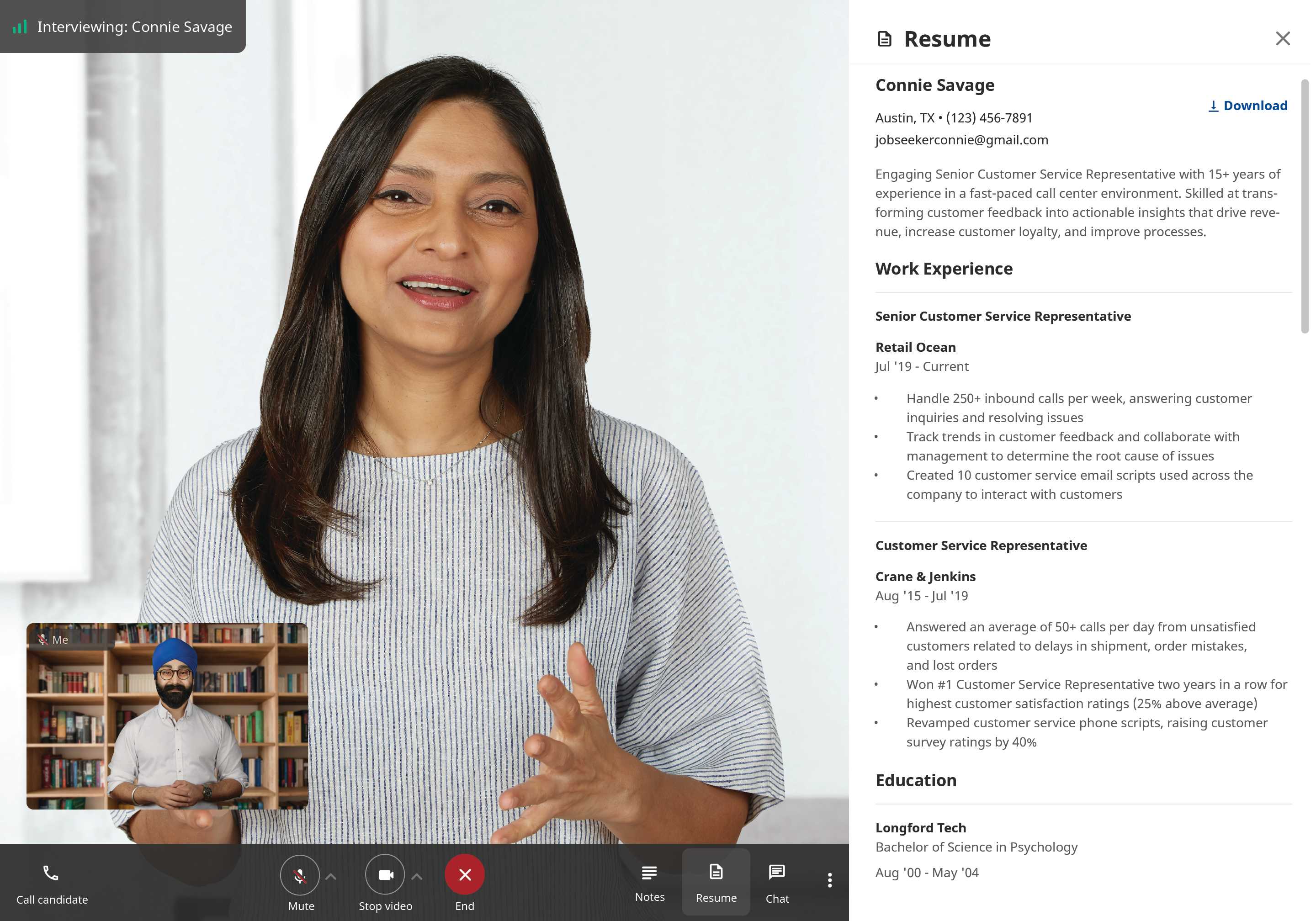It has been almost two years since the outbreak of the COVID-19 pandemic that has impacted people around the world. During these challenging times, Indeed built and launched its own virtual interviewing technology, Indeed Interview, to help people interview safely and effectively, hosting over a million interviews in order to connect job seekers and employers virtually.
Now, Maggie Hulce, Senior Vice President and General Manager of Enterprise at Indeed is taking the tools that helped us through the pandemic and evolving them for the future of recruitment. With 93% of employers planning to continue virtual interviews beyond the pandemic, the Indeed team isn’t shifting back to old ways of working – they’re expanding Indeed’s virtual offering
. Pushing forward with innovation despite uncertainty, Indeed believes virtual hiring tools are here to stay and are crucial to opening up real-world opportunities for both the employer and the job seeker.

Enhancing Indeed’s virtual video platform for employer and job seeker
In reaction to the pandemic, Indeed launched Indeed Interview in early 2020. Nearly two years on, this has made it possible for employers to add virtual interviewing capabilities to all jobs posted to Indeed. While much of the world stood still through the pandemic, Indeed was busy launching and adapting new elements, resulting in a frictionless suite of recruitment tools. Employers can now post, manage, screen, schedule, and interview from one place without the need for standalone tools that clutter the HR tech stack.
“We’re constantly watching and listening, changing the platform as our employers and job seekers need it. The latest updates to Indeed Interview are focused on helping employers make the most of their time with candidates,” Maggie says.
While conducting interviews, prospective employers can now view candidate resumes alongside the video, giving quick access to employment history and qualifications without switching to another window. Private notes can be added on the side, snapshotting in-moment thoughts that can later be shared with the broader team and candidate for accurate feedback. Maggie comments, “How many times have we all sat down after an interview, scanning our scribbles and wishing we could remember our thoughts? It’s frustrating. We wanted a real-time tool to address that need.” A chat feature offers an alternative method of communicating before, during, and after the interview, while scheduling tools sync directly with calendars. Newly launched panel interviews also allow multiple interviewers to join for a collaborative approach to hiring. Indeed Interview is available in 13 countries, any recruiter who posts a job on Indeed, whether sponsored or not, can add virtual interviewing capabilities.
“I think it’s really important that we offer a suite of tools that makes recruitment easy, even in the most difficult times,” Maggie says. “So we spent a lot of time developing the scheduling experience and navigating technology challenges such as firewalls and poor internet connections. Calendar synchronization has also been vital as reminders about scheduled interviews can reduce the number of no-shows.”
Job seekers also gain from these updates to Indeed. From a single browser tab with no third-party downloads, candidates can search for their perfect job, quickly and easily apply, schedule an interview, participate in an interview, and accept the job in a matter of days. In addition, the online process enables job seekers to do everything from home, with no travel expenses and added stress. It’s therefore no surprise that 21% of job seekers are more likely to accept a video interview invitation than an in-person meeting*.
*Indeed’s own research

Leveraging digital technology to match the right person to the right job
Since launching, over a million interviews have taken place on Indeed Interview, many of them within two days of scheduling. That’s 20% faster than traditional face-to-face interviews. Employers have also reported 40% fewer candidate no-shows. Beyond these immediate impacts, the bigger picture shows virtual interviewing creating a widening talent pool. “Our research suggests 94% of employers are now open to hiring outside of local markets, with 84% reporting enhanced variety in their application pool,” Maggie notes.
When labor markets are competitive, the best candidates won’t wait for businesses with slow, clunky processes. Connecting with talent seamlessly and conveniently throughout the hiring journey is crucial to quickly take people off the job market before anyone else can. “We’re hoping to see hiring managers using our new tools in innovative ways. This might be recording personalized videos that are sent in advance of interviews via employer messaging tools, for example. A quick hello from the team or future boss could go a long way to bringing humanness to the journey and making the right candidates feel wanted,” she adds.
Indeed believes that making the process more convenient and hassle-free helps people focus on showcasing the best of themselves throughout the interview stages. “Getting a job is all about human connection, and in a virtual environment that isn’t lost. If anything, it’s improved as people aren’t as flustered and are more confident in their own space. As we see society becoming more flexible and transparent, we understand that job seekers want a relaxed conversation with an employer without the formality of a ‘traditional’ interview,” she says. “A job can be more than just a paycheck; it can help form our identity and overall happiness. Happy people help create healthy businesses. So, if we can leverage digital technology to match the right person to the right job, then we’re succeeding.”
Connecting people to better work, for better lives
In the US, employers want to fill roles quickly, yet candidates are hesitant to start new jobs in an uncertain landscape. Indeed’s own research suggests this lack of job seeker urgency is temporary. But, as the storm clears and more candidates seek new opportunities, businesses must streamline their processes while maintaining the humanness of the experience, even if candidates are at home or in another country. How do they do this: by embracing and developing virtual technology.
As mentioned in Recruit Group’s sustainability goal, which was announced on May 17, 2021, simplifying the hiring process also contributes to opening up economic opportunity and aid in eliminating poverty.
Maggie concludes, “Our jobs are linked to our happiness, family, dreams and ambitions. So, if technology can simplify the hiring process and quickly connect job seekers to the meaningful work they love, it’s hugely important. Of course, virtual technology is a tiny piece of a broader recruitment ecosystem, but it’s had huge uptake and innovation in recent years. Having seen its potential, staying static isn’t an option, and what started as a reaction to the pandemic may well shape recruitment for many years to come.”

Maggie Hulce
Senior Vice President and General Manager of Enterprise at Indeed